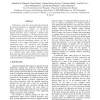Free Online Productivity Tools
i2Speak
i2Symbol
i2OCR
iTex2Img
iWeb2Print
iWeb2Shot
i2Type
iPdf2Split
iPdf2Merge
i2Bopomofo
i2Arabic
i2Style
i2Image
i2PDF
iLatex2Rtf
Sci2ools
125
click to vote
TABLETOP
2007
IEEE
2007
IEEE
Affective Tabletop Game: A New Gaming Experience for Children
In this paper, we discuss various options for enhancing the gaming experience in augmented tabletop games. More specifically, we propose to incorporate psychophysiological measurements as a part of the gaming experience, and to integrate a desktop game within its real surrounding (i.e., the entire room) in order to promote more physical activity. Such design options, together with other game rules, aim at promoting social interaction between participating players, as this is considered to be a major characteristic of any good multi-player game. We concretized and informally evaluated the above aspects within a specific tabletop game that we designed for children aged 7 to 11 years. Our findings indicate that psychophysiological feedback in a tabletop game does indeed facilitate social interaction and adds to the fun element. Our results also reveal that children appreciate the involvement of the real world environment in a tabletop game.
Related Content
| Added | 04 Jun 2010 |
| Updated | 04 Jun 2010 |
| Type | Conference |
| Year | 2007 |
| Where | TABLETOP |
| Authors | Abdullah Al Mahmud, Omar Mubin, Johanna Renny Octavia, Suleman Shahid, LeeChin Yeo, Panos Markopoulos, Jean-Bernard Martens, Dima Aliakseyeu |
Comments (0)

